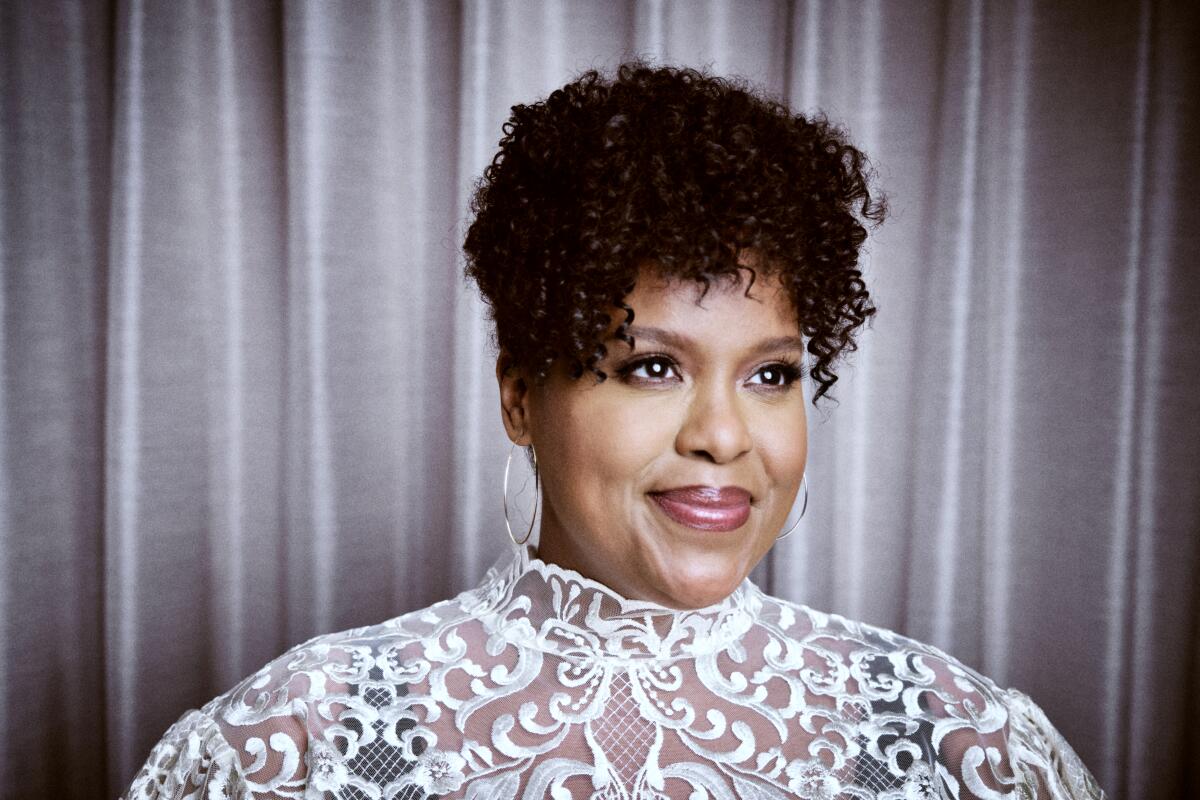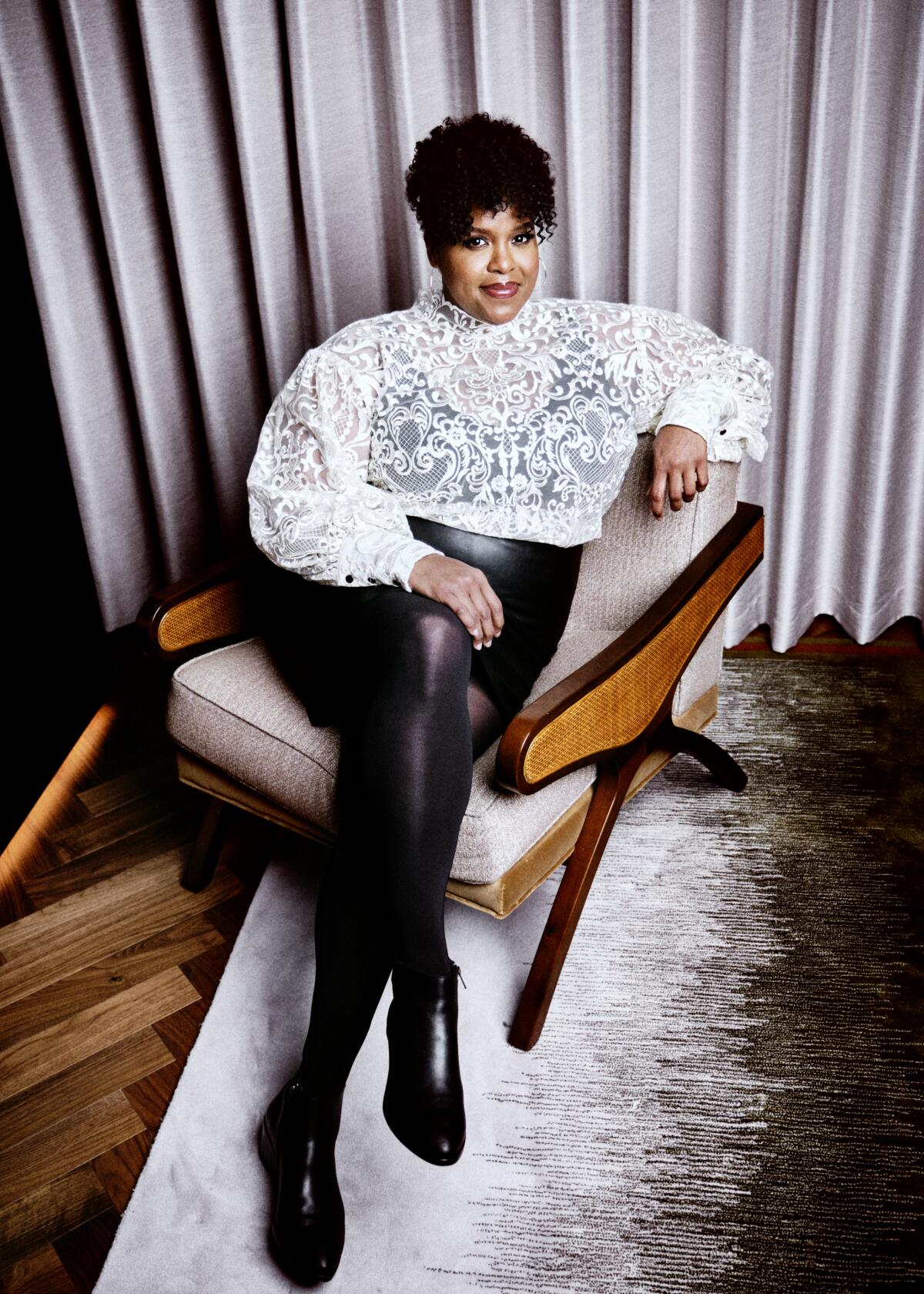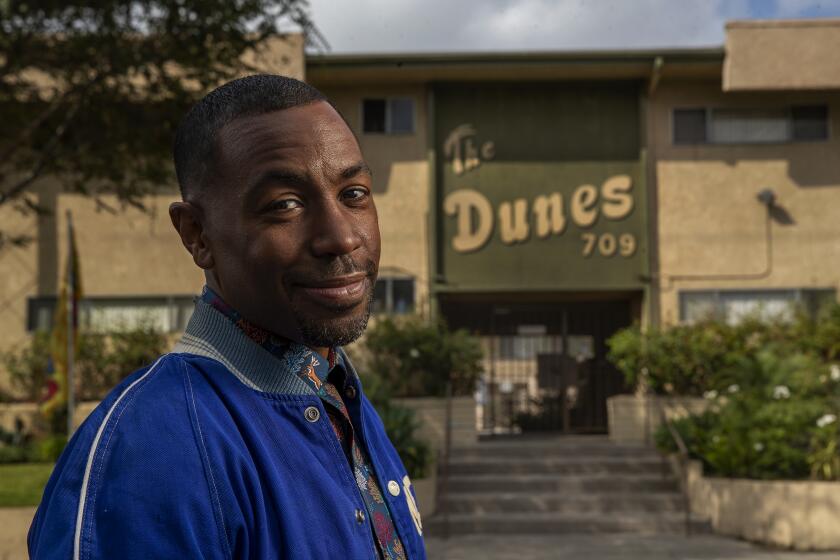‘SNL’ nearly squashed Natasha Rothwell. Then ‘Insecure’ helped her find her voice

- Share via
About five years ago, before “Insecure” secured its place as one of HBO’s most acclaimed comedies, the series’ writers were in the midst of a ruthless Nerf war when series co-creator and star Issa Rae approached staff writer Natasha Rothwell with what she remembers as a suspicious proposition.
“We were in separate factions in the writers room,” Rothwell says, describing the battle of foam projectile-firing toy weapons. “At any point during the week, you could get ambushed. Issa called me into her office saying something like, ‘We need to talk to you.’ I wasn’t on her side [in the game] at that time, so I was thinking, ‘They’re going to kidnap me, this is part of the Nerf war.’ I was ready to throw down.”
She wound up throwing down tears.
Unarmed with puffy darts, Rae and Prentice Penny, the series’ showrunner, had called in Rothwell to tell her she was best suited to play Kelli Prenny, the perennial we-don’t-deserve-her supportive friend who brings her unforgettable sense of humor to any interaction of “Insecure’s” posse of friends. Up to that point, Rothwell had unofficially brought life to the character in the writers’ room and during readings of scripts — and performing as if she weren’t auditioning turned out to be the perfect audition.
“It was so unexpected,” Rothwell, now 41, says during a recent video chat. “I was giving the kind of tears where it’s the ugly cry that’s just for yourself. I felt so seen as a whole creator.”
In the time since, Rothwell’s scene-stealing performance has made Kelli a fan-favorite GIF queen — her line about “growth” from a Season 2 episode is likely circulating in hundreds of text threads at this very moment. Now, as “Insecure” nears its end, Rothwell is adding another hyphen to her title, making her debut as a television director with Sunday’s episode.
As Kelli might say, Rothwell is thriving. In abundance.
She recently signed an overall deal with ABC Signature to develop television projects through her imprint, Big Hattie Productions. This summer, she earned praise in HBO’s buzzy satire “The White Lotus” for her poignant performance as Belinda, the overworked and courteous spa manager at a luxury Hawaiian resort who dreams of opening her own business. And she’ll soon appear in the sequel to “Sonic the Hedgehog,” out next spring; the upcoming musical fantasy “Wonka,” a prequel to Roald Dahl’s “Charlie and the Chocolate Factory” ; and “We Were There, Too,” a John Hughes-inspired coming-of-age story she co-wrote with Gloria Calderon Kellett about “the Brown kids, the LGBTQ kids, the Black kids, the real outsiders.”
The complete guide to home viewing
Get Screen Gab for everything about the TV shows and streaming movies everyone’s talking about.
You may occasionally receive promotional content from the Los Angeles Times.
“I think a lot of people are like, ‘overnight success,’ but I’ve been at it for a while,” she says. “I just never knew that this was in the cards. I knew that if I approached my craft with integrity and intention and [did] my best to honor the gift that God’s given me, that good things would happen, I just didn’t know ‘good’ would be ‘great’ and ‘great’ would be ‘out of this world.’ ... I remember watching Taylor Swift early in her career and with every award, she’s always in shock, like, ‘Oh, my God, I can’t believe it.’ You’re just like, ‘Really, Taylor Swift?’ But I have so much empathy for her right now because every interview, I feel Taylor Swift more and more.”
Wearing a sweater of swirling pastels that looks like it’s been elegantly spun in a cotton candy machine, Rothwell is low-key bubbly: “A lot of people confuse me for Kelli in real life. They’ll come up to me and be very confused as to why I’m deeply introverted, very much a wallflower, homebody.” She’s contemplative until a topic really lights her up — like when she, a self-described rom-com junkie, talks about living in London, one of the capitals of meet-cute cinema, where she’s shooting “Wonka.”
“When I tell you I had dreams of moving to London when I was like 25, thinking: ‘I’m gonna be Black Bridget Jones. I’m just going to live that life. It’s going to be perfect. I’ll find my Darcy.’ I haven’t even been to Notting Hill yet because the pressure, I s— you not. I am so scared that going there is going to ruin the ‘Notting Hill’ in my heart. I will go, obviously. But, I mean, [the movie] is about an American actress and finding love. It’s putting a lot of pressure on me!”
It’s long been her ambition to write a romantic comedy for the big screen — one that broadens Hollywood’s representation of who gets to experience grand gestures of love. And she’s already proved that she’s good for it on “Insecure,” writing last season’s memorable episode reuniting the show’s central exes, Issa (Rae) and Lawrence (Jay Ellis). Rothwell’s feature film attempt, “Black Comic-Con,” which she wrote in quarantine, was accepted into the Sundance Institute’s Screenwriters Lab. She’s hoping to direct the film, about a meet-cute at the popular convention, in the coming year.
Rothwell’s personal history suggests why she has a predilection for a genre built on sweeping stories about love and connection.
Showrunner Prentice Penny explains the HBO series’ highly specific geography, and dishes about what’s next for Issa and Molly.
Rothwell was born in Wichita, Kan., but grew up on Air Force bases from Albuquerque to Turkey. Her dad was in the service, so her family became accustomed to a life of change — she went to two elementary schools, two middle schools, and two high schools. From an early age, she figured out that humor was a dependable icebreaker when meeting new classmates.
“Humor was such an easy way for me to put myself out there,” she says. “And it gave me an opportunity to hone my craft and be like, ‘What is this audience like?’ It was very formative. But it definitely made me a tough sort of nut to crack, because it’s hard to be vulnerable and pursue deep relationships when you think you’re going to leave, and you are anticipating heartbreak. Each move was an opportunity to win friends and influence people and when you’re doing that, you’re not thinking about: ‘Let me be my most authentic self, let me just be who I am.’ It’s, ‘Who did they want me to be? I can do that.’”

It’s not lost on Rothwell that she’s carried that impermanence into her own career, particularly as she processes her most pivotal transition to date.
“I feel like every show is like a military base,” she says. “Leaving ‘Insecure’ is not unfamiliar; I’m used to leaving places and people that I love a lot and know how to take care of those friendships, even if I’m not there.”
And Rothwell continues to create a lasting impression among her peers.
Writer-director Mike White and his cast reveal how HBO’s limited series unearthed the ‘apocalyptic anxiety’ beneath the surface of luxury tourism.
“I always believed everything Natasha did and said,” says Jennifer Coolidge, who plays a wealthy woman who takes advantage of Rothwell’s character in “The White Lotus.” “My favorite memory on [the show] was a day we were stuck out in the middle of the ocean with choppy waves that were making me seasick. [Series creator] Mike White asked us to improvise a scene regarding our many failed relationships with men. It was painful but truly hilarious. The stuff Natasha came up with made me howl... I could never predict how she was going to deliver a line or how she would look at me. Some of the greatest actors can seduce you into thinking the scene is reality. Natasha has that. She makes you forget you’re on a film set.”
Rae remembers how Rothwell, who moved from New York to L.A. to work on “Insecure,” didn’t know many people or the city all that well — and, just as she had as a kid adjusting to new surroundings, she turned to humor.
“From her first day in the room, she set up this hilarious bit involving talking to an imaginary person on this big-ass conference phone we had in the writers room about how things were going for her in L.A.,” Rae recalls. “Whenever she’d pitch something that we’d like, she’d pick up the phone and say something in a low voice like, ‘Hey... yeah, unpack my suitcases, they like me.’ And if we didn’t respond to a pitch, she’d pick up the phone and say something like, ‘Hey... can you start looking up flights back? Thanks.’ Throughout that first season, that phone would serve as her own inner monologues to things that were happening in the room, sometimes about specific writers. It never failed to crack us all up.”

Still, as Rothwell herself points out, it was not a simple path to that room, or beyond. Rothwell originally studied journalism, too scared to consider acting as a career and thinking it would satisfy her interest in writing. She quickly realized it wasn’t her vibe: “Objectivity is not my strong suit,” she says. “A b— got opinions. I would write these big, flowery pieces just chock full of opinion. I’m thinking of one now that I did during the, like, five-year anniversary of the Oklahoma City bombing. I just went in on Timothy McVeigh. And my editor was like: ‘You can’t call him a bastard,’ and I’m like, ‘But it’s punctuated correctly!’”
She later switched to theater and — convinced she’d make a horrible waitress — became an educator after graduation. She moved to Tokyo and taught English part time while performing at the Tokyo Comedy Store before returning stateside, where she worked as a high school drama teacher in the Bronx for four years. (White has at least one idea for a future “White Lotus” plotline that draws on Rothwell’s experience abroad, in which Belinda is transferred to Japan.)
“When you walk through the world with brown [breasts], people think a lot about you; people have opinions,” she says. “So, for me, it was important not to assume anything about my students. I want to say 99.9% of my students were people of color. I didn’t want to do ‘Raisin in the Sun.’ We’re doing Neil Simon’s ‘Rumors,’ we’re doing “You’re a Good Man, Charlie Brown,’ we’re going to do ‘Oedipus Rex’ — and the kids ate it up. To have a room of kids laugh at Neil Simon — brown babies from the Bronx who probably never heard that name before. I just wanted to open their eyes to the theater world in a big way.”
Then, in 2014 — when “Saturday Night Live” was actively searching for a Black woman to join the cast — Rothwell auditioned. Sasheer Zamata won the role, but Rothwell made enough of an impression to be offered a spot in the writers room. And though she’s careful not to diminish the experience entirely, Rothwell says her short time on the series negatively influenced how she carried herself.
“I didn’t want folks to think I got in to satisfy a requirement,” Rothwell recalls. “I wanted to show that I belonged. I wanted to be at the table at ‘SNL’ and I wanted them to think, ‘F—, she’s funny. I like what she has to say. And I see her and, oh, that joke is great.’ That’s a lot to carry. And I think that’s also an expression of privilege for white writers: They don’t know what it’s like to walk into a room and feel like the audition is not over. I didn’t feel seen, always. Putting my hand up was me wanting to know if my voice could be heard. It was Pavlovian for me.”
“I remember saying, ‘Girl, you don’t have to raise your hand like that. Why do you keep raising your hand? Just say it,’” says Penny, emphasizing that Rothwell was the first writer hired for “Insecure.” “And she’s like, ‘Well, because at my last show, I wasn’t allowed to speak. I had to kind of ask, ‘Can I speak?’ That broke our heart in the room to hear that. The idea that anybody would try to f— squash her talent or try to keep her brilliance under a lampshade — like, can you imagine?”
Rothwell eventually found her confidence at “Insecure.” And it’s fueled her ever since.
“Insecure” co-star Natasha Rothwell wrote the game-changing capsule episode of the HBO comedy, featuring Issa Rae and Jay Ellis.
“The confidence that I had coming into ‘White Lotus’ ran laps around what I started ‘Insecure’ with,” she says. “Me six years ago would have just said yes to the part, no questions asked. But me now said, ‘I need to talk to the director because as a person of color, in a servile position with a homogenous group, I want to make sure we do this right.’ ... There’s no way I would have had that confidence had it not been for ‘Insecure’ — and also the confidence I had as a writer, to be able to pitch jokes and pitch moments to Mike White, who I’ve been watching since ‘Freaks and Geeks’ — to feel like I belonged at the table with him.”
“She read the scripts from a dramaturgical point of view, not just as an actor,” White says. “She was so reflective about it. She had a more holistic take on the entire project, and I felt seen in the circus that we were building, having a like-minded person that I could try to lean on.”
“The White Lotus” not only marked a breakthrough moment for her as an actor, but it also presaged her next move: As Rothwell took stock of her life and career during quarantine — much as Kelli reflects on her legacy after being erroneously listed as dead at her 10th college reunion — she began to consider what she wanted the next five years to look like.
“I wanted to direct TV. I wanted to direct a movie. I want to be in that space legitimately and be a player in that space,” she says. “And so when it came time to direct during the season, I had a fire that I don’t think I would have had prior to the pandemic. It was an activator in a very real way.”
The episode, Rothwell says, is about choices: “It’s sort of the come-to-Jesus moment with Issa, Lawrence and Nathan [Kendrick Sampson], and understanding that you have to stand behind the decisions you make and also make decisions that are about what you want and not what you think other people want. It’s basically a call to arms for authenticity. And we see in the episode, Nathan is wondering if he made the right choice about being in the barbershop; Issa’s wondering if she’s made the right choice by not being with Lawrence, and is Nathan the right idea? It typifies your 30s: “What do I think? What do I feel like? What do I want? What do you want?”
Now, Rothwell is learning how to answer those questions. And you know what that is? Growth.
More to Read
The complete guide to home viewing
Get Screen Gab for everything about the TV shows and streaming movies everyone’s talking about.
You may occasionally receive promotional content from the Los Angeles Times.








